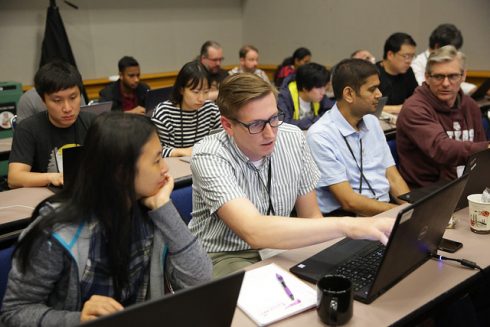
The O’Reilly Open Source Software Conference (OSCON) is taking place this week in Oregon, gathering together industry leaders to talk about open source, cloud native, data-driven solutions, AI capabilities and product management.
“OSCON has continued to be the catalyst for open source innovation for twenty years, providing organizations with the latest technological advances and guidance to successfully implement the technology in a way that makes sense for them,” said Rachel Roumeliotis, vice president of content strategy at O’Reilly and OSCON program chair. “To keep OSCON at the forefront of open source innovation for the next twenty years, we’ve shifted the program to focus more on software development with topics such as cloud-native technologies. While not all are open source, they allow software developers to thrive and stay ahead of these shifts.”
A number of companies are also taking OSCON as an opportunity to release new software and solutions. Announcements included:
IBM’s Data Asset eXchange (DAX)
DAX is an online hub designed to give developers and data scientists a place to discover free and open datasets under open data licenses. The datasets will use the Linux Foundation’s Community Data License Agreement when possible, and integrate with IBM Cloud and AI services. IBM will also provide new datasets to the online hub regularly.
“For developers, DAX provides a trusted source for carefully curated open datasets for AI. These datasets are ready for use in enterprise AI applications, with related content such as tutorials to make getting started easier,” the company wrote in a post.
DAX joins IBM’s other initiatives to help data scientists and developers discover and access data. IBM Model Asset eXchange (MAX) is geared towards machine learning and deep learning models. The company’s Center for Open-Source Data and AI Technologies will work to make it easier to use DAX and MAX assets.
New open-source projects
IBM also announced a new open-source project designed for Kubernetes. Kabanero is meant to help developers build cloud-native apps. It features governance and compliance capabilities and the ability to architect, build, deploy and manage the lifecycle of a Kubernetes-based app, IBM explained.
“Kabanero takes the guesswork out of Kubernetes and DevOps. With Kabanero, you don’t need to spend time mastering DevOps practices and Kubernetes infrastructure topics like networking, ingress and security. Instead, Kabanero integrates the runtimes and frameworks that you already know and use (Node.js, Java, Swift) with a Kubernetes-native DevOps toolchain. Our pre-built deployments to Kubernetes and Knative (using Operators and Helm charts) are built on best practices. So, developers can spend more time developing scalable applications and less time understanding infrastructure,” Nate Ziemann, product manager at IBM, wrote in a post.
The company also announced Appsody, an open source project to help with cloud-native apps in containers; Codewind, an IDE integration for cloud-native development; and Razee, a project for multi-cluster continuous delivery tooling for Kubernetes.
“As companies modernize their infrastructure and adopt a hybrid cloud strategy, they’re increasingly turning to Kubernetes and containers. Choosing the right technology for building cloud-native apps and gaining the knowledge you need to effectively adopt Kubernetes is difficult. On top of that, enabling architects, developers, and operations to work together easily, while having their individual requirements met, is an additional challenge when moving to cloud,” Ziemann wrote.
WSO2 API Micrograteway 3.0 announced
WSO2 is introducing a new version of its WSO2 API MIcrogateway focused on creating, deploying and securing APIs within distributed microservices architectures. The latest release features developer-first runtime generation, runt-time service discovery, support for composing multiple microservices, support for transforming legacy API formats and separation of the WSO2 API Microgateway toolkit.
“API microgateways are a key part of building resilient, manageable microservices architectures,” said Paul Fremantle, WSO2 CTO and co-founder. “WSO2 API Microgateway 3.0 fits effectively into continuous development practices and has the proven scalability and robustness for mission-critical applications.”
Carbon Relay’s new AIOps platform
Red Sky Ops is a new open-source AIOps platform to help organizations with Kubernetes initiatives as well as deploy, scale and manage containerized apps. According to Carbon Relay, this will help DevOps teams manage hundreds of app variables and configurations. The solution uses machine learning to study, replicate and stress-test app environments as well as configure, schedule and allocate resources.
Carbon Relay has also announced it will be joining the Cloud Native Computing Foundation to better support the Kubernetes community and the use of cloud native technologies.






